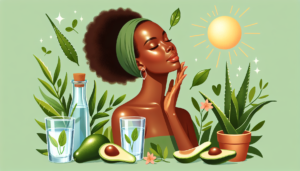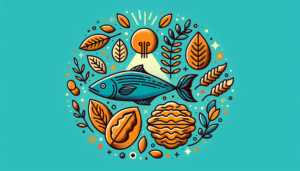The Impact of Diet on Your Skin’s Youthfulness
Understanding Skin Health: The Connection Between Diet and Youthfulness
The Skin Structure and Aging
Understanding the structure of the skin is crucial in comprehending how diet impacts its youthfulness. The skin comprises three layers: the epidermis, dermis, and subcutis.
-
Epidermis: The outermost layer that serves as a barrier, consisting of numerous cells including keratinocytes, which produce the protein keratin.
-
Dermis: This mid-layer consists of connective tissue and contains collagen and elastin fibers, which provide strength and elasticity.
- Subcutis: The deepest layer that provides insulation and absorbs shocks, primarily made up of fat and connective tissue.
As we age, the production of collagen and elastin declines; this leads to sagging skin, the appearance of fine lines, and loss of firmness. Diet directly influences this process through nutrient contributions that can either accelerate or mitigate skin aging.
Key Nutrients that Promote Skin Youthfulness
-
Antioxidants: These are essential in combating oxidative stress caused by environmental factors like UV radiation and pollution. Key antioxidants include:
- Vitamin C: Promotes collagen synthesis, aiding in skin repair and firmness.
- Vitamin E: Protects skin cells from damage and has moisturizing properties.
- Beta-Carotene: Converts to vitamin A, helping to maintain skin health and promote cell regeneration.
-
Healthy Fats: Omega-3 and Omega-6 fatty acids play a critical role in maintaining skin barrier function and creating a beautiful, youthful glow.
- Sources: Fatty fish (like salmon), walnuts, flaxseeds, and chia seeds.
-
Proteins: Amino acids from proteins are vital for collagen production. Collagen supplements have gained popularity, but adequate protein consumption from sources such as lean meats, beans, and nuts is crucial.
-
Vitamins and Minerals:
- Zinc: Important for healing, and aids in the prevention of acne. Sources include legumes, nuts, and whole grains.
- Selenium: Protects the skin from UV damage and can improve skin elasticity. Brazil nuts are an excellent source.
- Hydration: Water is critical for skin elasticity and suppleness. Adequate hydration helps maintain skin moisture levels and promotes a plump appearance.
Foods that Fight Aging
-
Fruits and Vegetables: Rich in antioxidants, vitamins, and minerals, they should form the base of your diet.
- Berries (blueberries, strawberries): High in antioxidants.
- Leafy Greens (spinach, kale): Provide vitamins C, E, and K.
-
Nuts and Seeds: Frequently overlooked, these are potent sources of healthy fats, protein, and antioxidants.
- Almonds: Rich in vitamin E, they protect skin from oxidative stress.
- Pumpkin seeds: High in zinc, which aids in wound healing.
-
Whole Grains: These have a low glycemic index and can assist in keeping blood sugar levels stable, preventing the rapid aging associated with high sugar intake.
- Quinoa, brown rice, and oats are great choices.
-
Fermented Foods: Such as yogurt and sauerkraut are beneficial for gut health, which in turn, impacts skin health. A healthy gut can reduce inflammation and improve skin’s appearance.
- Green Tea: Loaded with polyphenols, particularly epigallocatechin gallate (EGCG), which has been shown to improve skin hydration, thickness, and elasticity.
The Role of Processed Foods and Sugars
High sugar and processed food intake can have a detrimental effect on skin health. The glycation process occurs when sugar molecules bind to proteins, forming advanced glycation end products (AGEs) that can damage collagen and elastin in the skin. This leads to accelerated aging, including wrinkles and sagging.
The Effect of Hormones on Diet and Skin
Hormones interact with nutrition, further influencing skin health. For example, the hormone insulin can be affected by diet, particularly through the consumption of carbohydrates. High-carbohydrate diets can result in insulin spikes, which may exacerbate acne and skin inflammation.
Conversely, a balanced diet that incorporates low-glycemic foods may help control insulin levels, ultimately benefiting skin health.
Lifestyle Factors Intertwined with Diet
-
Sleep: The body repairs itself during sleep, including skin rejuvenation. Poor sleep can lead to increased stress hormones (like cortisol), contributing to skin issues. A healthy diet contributes to improved sleep quality through better nutritional balance.
-
Exercise: Regular physical activity promotes blood circulation, delivering nutrients to the skin and removing toxins. A nutrient-rich diet supports recovery and enhances skin health post-exercise.
- Stress Management: Chronic stress can lead to skin problems like eczema and acne. Foods rich in omega-3s, antioxidants, and holistic nutrition can help manage stress levels.
Dietary Patterns for Youthful Skin
-
Mediterranean Diet: Emphasizes fruits, vegetables, whole grains, fish, and healthy fats (like olive oil) while being low in processed foods and sugars. This pattern has been linked to improved skin health.
-
Plant-Based Diet: Rich in antioxidants and other essential vitamins and minerals, a diet focused on whole, plant-based foods can vastly improve skin vitality and reduce signs of aging.
- Balanced Diet: Consisting of a variety of food groups ensures the body receives all necessary nutrients. This includes adequate protein, healthy fats, carbs, vitamins, and minerals.
The Importance of Individualization
While general guidelines can be beneficial, it is essential to recognize individual differences in response to diet. Factors such as genetics, skin type, age, and existing skin conditions must be considered when tailoring dietary recommendations for skin health.
Supplements: Do They Help?
Supplements can be beneficial for those who struggle to obtain sufficient nutrients through their diet. Popular supplements for skin health include:
- Collagen: May boost elasticity and hydration.
- Vitamin C: Important for collagen synthesis.
- Biotin: Supports skin, nails, and hair health.
However, consult with a healthcare provider before starting any supplementation to ensure they fit individual needs and circumstances.
Final Thoughts on Diet and Skin Youthfulness
Integrating a holistic approach to skin health, focusing on diet, lifestyle, and mental well-being, is essential for maintaining youthful skin. Prioritizing nutrient-dense foods while minimizing processed foods and sugars ultimately contributes to healthier skin and overall well-being.








